Leave Taking: Characters (WJEC Eduqas GCSE English Literature): Revision Note
Exam code: C720
Leave Taking: Characters
Playwrights construct characters to embody concepts, represent ideas and communicate key themes. Each character serves a distinct narrative purpose. Below you will find character profiles of:
Main characters:
Enid Matthews
Del Matthews
Viv Matthews
Mai
Brod
Other characters:
Gullyman
Cynthia
Enid
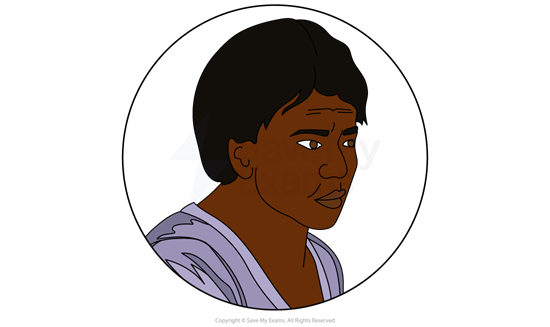
Enid is mother to Viv and Del; she is part of the Windrush generation and symbolises some of the struggles that her generation faced:
She is a single mother having left her husband due to domestic abuse:
This presentation allows Pinnock to challenge criticism of single mothers, something that was prevalent in the 1980s
Enid is presented as selfless and tenacious:
The audience learns that she has saved enough money while working two jobs to allow Viv to go to university
She stays in England to give her children as many opportunities as she can, even though she would prefer to be in Jamaica:
The selflessness of her decision to remain in the UK is highlighted when she tells her daughters, “People laugh at me, but they never laugh at you” (Scene 2)
Enid is presented as having a life that is characterised by hardship:
She has experienced disrespect due to her social status and the colour of her skin in both Jamaica and England
Her feet are injured due to the intensity of her work in Jamaica
Her mother disliked her for being “too black” (Scene 8)
She was unable to achieve her dreams of becoming a postmistress
Her sister, Cynthia, phones often from Jamaica to demand money
Enid is presented as having respect, both for the church and Obeah practices:
This shows that she is traditional and demonstrates a belief in spirituality
Throughout the course of the play, she becomes less emotionally repressed as she begins to open up and let others understand her more
The audience witnesses a change in her attitudes towards England throughout the play:
At the start of Scene 2 she says that “England been good to me”, then towards the end of the scene she says that she wants to return to Jamaica, before saying in Scene 3 that English “people laugh” at her:
Many people in the Windrush generation struggled to come to terms with the fact that England was not what they expected
At the start of the play, there is friction between Enid and Del:
Del wants to go out and have fun but Enid knows that she needs to focus on work to progress in life, especially because of her race, gender and background
Meanwhile, Del does not understand the hardships of Enid’s life:
In particular, she is unaware of the reality of her parents’ separation (Scene 7)
This is because Enid is hesitant to express her feelings, or speak of her painful past
Enid becomes more open by the end of the play, and her daughters and the audience learn that:
Enid’s mother disliked her and was very hard on her
She is exhausted by having to work so hard to provide for her children
She is heartbroken by how mistreated her children are in England because of their status as second-generation immigrants
At the end of the play, Enid and Del begin to repair their relationship:
Del “takes her mother’s hand into both her own and smoothes the palm” (Scene 8)
This scene highlights the importance of openness and understanding between different generations
Del Matthews
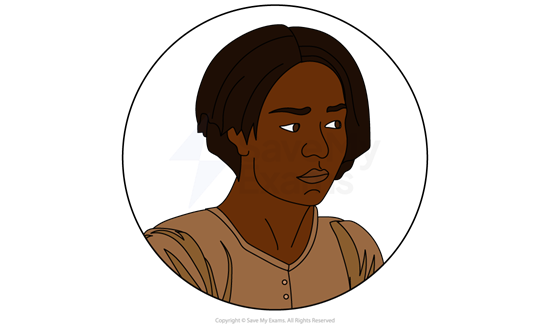
Del (or Delores) is Enid’s daughter, and they have a complex relationship
She symbolises the experience of second-generation immigrants:
She embodies aspects of Jamaican and English lifestyles, but does not seem to feel fully happy in either of the two worlds
Initially, Del is presented as wild, extroverted and argumentative:
She is often portrayed as not returning home at night
She enjoys parties: “I have been following that sound system for years” (Scene 2)
She was once caught shoplifting, which Enid sees as a personal failure
At the start of the play, she has just become pregnant — something that causes friction with her mother
She is presented as being disrespectful when first visits Mai’s bedsit:
She mocks Mai’s profession and shows a lack of interest
However, she tries to steal a charm, which implies that she may feel more of an affinity to Mai’s spiritual practice than she pretends
It is implied that Del’s rebelliousness is a result of the way society treats her:
She says saying that the police are “hunting” Black people down and that her work colleagues talk to her like she "can’t speak English” (Scene 2)
Her mistreatment allows Pinnock to show the impact of systemic discrimination and racism towards Black people in the 1980s
Del is dyslexic, but unsupported; her dyslexia impacts her confidence and her ability to realise her full potential
Her character develops throughout the play:
She embraces spirituality by becoming an Obeah woman
Her relationship with Enid seems to improve at the end as she begins to read her mother’s palm
Examiner Tips and Tricks
When revising for your English Literature examination, always remember that fictional characters in plays are not real; they are constructs created by the writer. Think carefully about what Pinnock is trying to communicate through her choice and presentation of the characters in Leave Taking, and discuss how Pinnock uses these characters to influence the audience.
Viv Matthews
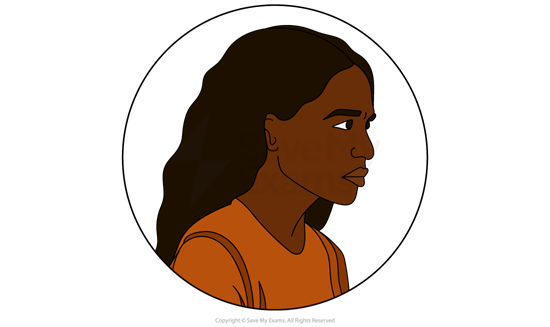
Viv is the younger sister of Del and the second daughter of Enid
She is intelligent and tenacious; she does very well at school and Enid boasts that she gets top marks
She often tries to mediate between her sister and mother as in Scenes 1 and 2
Like the rest of her family, she has a difficult relationship with Britain:
She does not feel a sense of belonging in the English education system: “Me and those teachers don’t speak the same lingo.” (Scene 5)
Like Del, Viv also symbolises the experience of second-generation immigrants and descendants of the Windrush generation:
Viv represents the strong immigrant work ethic, and the determination to carve out a place in society through education
Viv is grateful for her mother’s hard work and sacrifices:
Speaking to Brod, she admits, “She works so hard. I don’t know how she does it.” (Scene 2)
Viv struggles to cope with the interplay of the pressure her mother places upon her to succeed in school with her own desire to visit Jamaica to understand her cultural heritage:
Unable to see why Viv wants to go to Jamaica, Enid wants her to focus on her education and career
She almost misses her English Literature exam, but Del makes her go
Viv is presented as caring for her sister, saying she will help look after her baby:
Here Pinnock highlights the importance of familial relationships
Mai
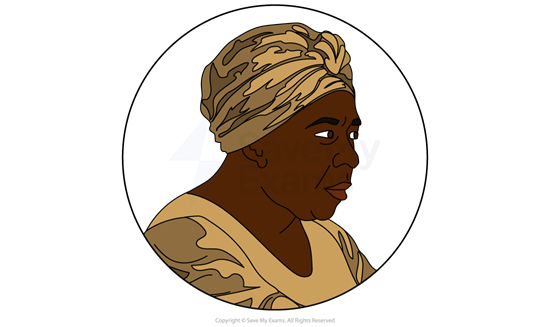
Mai is an Obeah woman who is caring, empathetic and intuitive:
She realises that Del is dyslexic but recognises Del's underlying abilities and encourages her to be an Obeah woman
After Del tries a charm from her, she just holds out her hand, knowing that Del attempted to take it (Scene 1):
Mai’s perceptiveness allows Pinnock to show the power of spirituality and to illustrate the importance of non-Western precepts and traditions
Mai helps Del, not only with her living situation, but with her relationship with her mother:
She lets her stay with her and makes her feel welcome: “You like having me around ... you’re starting to think that I’m actually quite
good company.” (Scene 5)
Although she threatens to throw Del out, she allows her to stay for what appear to be two reasons:
Del helps to fill the space in Mai’s life that was left by her son, from whom she is estranged
Mai sees spiritual promise in Del, and wants to train her in Obeah
In Scene 8, it is implied that Mai hopes for Del to carry on Mai’s spiritual practice after Mai dies
Mai helps to heal the relationship between Del and Enid, ensuring sure Del has a better understanding of her mother’s perspective
Despite all this, Mai is portrayed as being tired of her practice and helping people with their problems:
She has spent so long trying to help people to repair their lives that she has “come to the end. My battery dead.” (Scene 6)
She is also ill, and has a heart condition that she believes will eventually kill her
Brod

Brod (or Broderick) is a close friend of Enid and has a familial relationship with the Matthews family
He is a joker, but is shown to have a serious drinking problem, likely because of the unpleasant experiences that he has endured as an immigrant in Britain:
He used to always “wave” the British flag, but his experience of Britain has affected his ethnic identity (Scene 2):
The British government threatened to rescind his citizenship and he had to pay to retain it; he lives with the fear that it will be taken away forever
Here Pinnock highlights the devastating effects of state hostility towards immigrants
Brod cares for Enid and her family and is presented as a good and loyal companion:
In Scene 7, he tries to make Del understand her mother’s struggles and return home
He urges Enid to teach the children where they “come from ...These girls got Caribbean souls.” highlighting the importance he places on the girls understanding their Jamaican identity (Scene 2)
The audience learns that he is an alcoholic:
He drinks a whole bottle of rum before going to Mai’s bedsit:
Here Pinnock highlights the harmful impact of racism and the tragic measures that some take to dull the pain
He often eats dinner at Enid’s flat:
After he has to leave, he explains that “There was no rice and peas last night ... You mother gone mad” (Scene 7):
Here Pinnock alludes to immigrants forming their own small communities, safe from discrimination
Gullyman
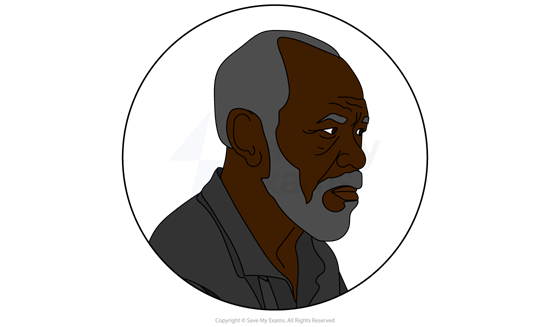
Gullyman is described by Brod during an exchange with Enid and Viv in Scene 2:
Gullyman is a fellow Jamaican immigrant and former friend of Enid and Brod
In order to try to fit into his adopted home, Gullyman went to great lengths to imitate the English manner of speaking
Despite his efforts to integrate, Gullyman suffered horrendous racist abuse that led his mind to “crack” to the point that he can now barely even “talk broken English”:
Gullyman symbolises the negative Windrush experience; his identity was undermined by his experience in Britain
Although he once felt British, his experience of rejection led to a breakdown, just as Brod’s experiences have led to him to alcoholism
Cynthia
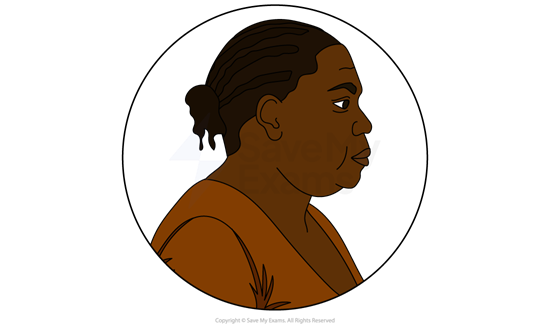
Cynthia is Enid’s sister who has a hard life in Jamaica
She knows Brod, but does not seem to have much of a relationship with Viv or Del
Enid believes that Cynthia has been lying about her mother’s illness to gain money:
We do not find out whether or not Cynthia ever deceived Enid, but in Scene 3 we hear that Enid’s mother has died
Her life in Jamaica is characterised by poverty:
Mai says that Enid should send her money, whatever the truth
Source
Pinnock, W. (2018). Leave Taking. NHB Modern Plays.

Unlock more, it's free!
Did this page help you?